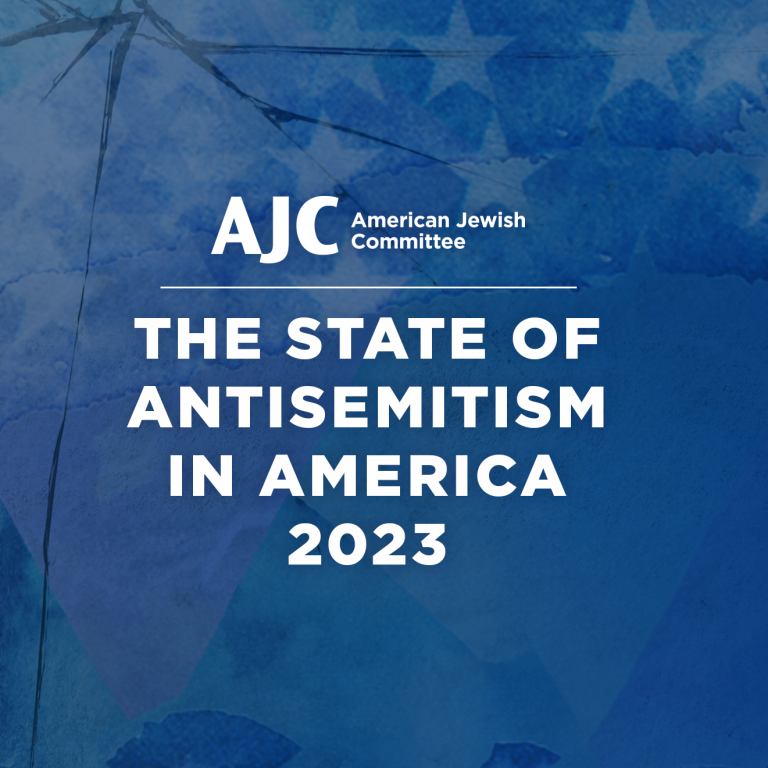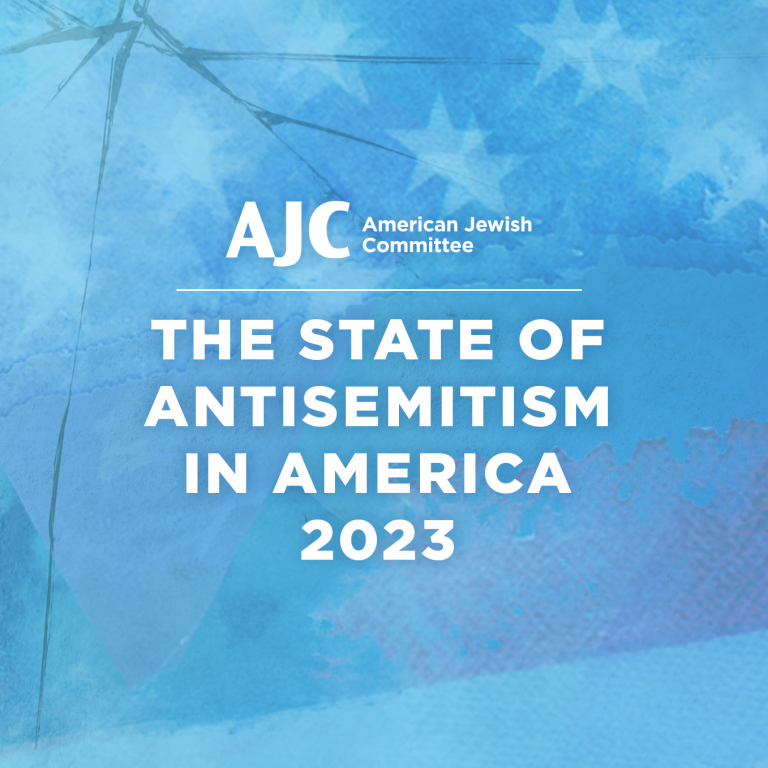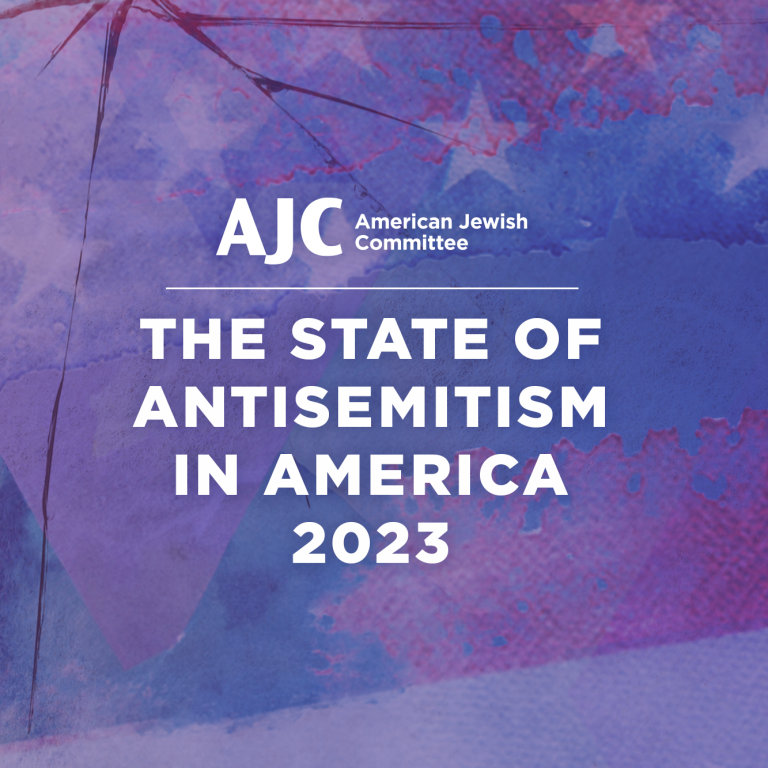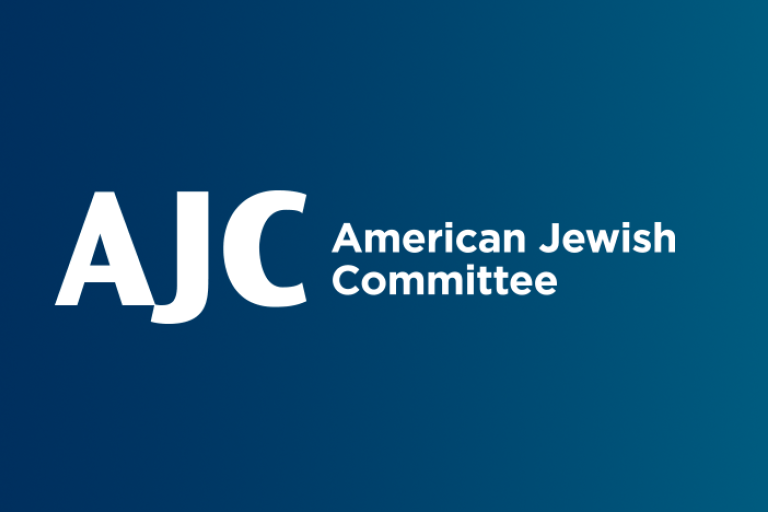February 13, 2024
For the past five years, AJC’s State of Antisemitism in America Report – the most comprehensive study of its kind – has measured the impact of antisemitism on Jewish Americans and, for the past four years, compared these findings with how the U.S. general public perceives the threat.
Field work began on October 5, 2023. But on October 7, as Hamas terrorists murdered over 1,200 Jews and Israelis and kidnapped hundreds more, the ground suddenly shifted. AJC worked with the independent research firm SSRS to leave the field and add new questions to reflect the new reality facing American Jews. The revised survey fully launched on October 17 and generated some grim findings.
Here are five key takeaways from AJC’s State of Antisemitism in America 2023 Report.
1. Hamas’ massacre of Israelis made most American Jews feel less safe.
Of the 98% of American Jews who heard at least a little about the October 7 terrorist attack on Israel by Hamas, almost eight in ten said it made them feel less safe.
“The attacks in Israel have left me feeling isolated and unsafe,” one 35-year-old man said. “Cheering our deaths and murders and justifying it as resistance is very, very upsetting.”
More than six in ten American Jews (63%) said the status of Jews in the U.S. is “less secure than a year ago”– more than a 20 percentage-point increase in just one year and a 30 percentage-point increase in two years. The number one reason given for feeling this way is the Hamas-Israel war.
Those feelings of unease are also reflected in the finding that in the past year, nearly half (46%) of American Jews have changed their behavior out of fear of antisemitism in at least one of the following ways: avoiding certain places or events, publicly wearing or displaying things, or posting social media content that might identify them as Jewish. Those who felt at least a little less safe after October 7 were far more likely to have altered their behavior.
“It is sadly not surprising that the vast majority of American Jews are feeling less safe today than they did before October 7, 2023,” said AJC CEO Ted Deutch. “In the days, weeks, and months since the terror attack, the world has seen a staggering increase in antisemitic speech, anti-Jewish violence, and demonstrations glorifying Hamas terrorists. How are Jews supposed to feel secure when so many side with the murderers in the wake of the deadliest attack against the Jewish people since the Holocaust?”
Most American Jews (93%) said antisemitism is a very or somewhat serious problem in the U.S., with more than half (53%) saying the problem is very serious. Almost nine in ten (86%) American Jews said antisemitism has increased in the past five years.
Holly Huffnagle, AJC’s U.S. Director of Combating Antisemitism, said the rise in violence and growing acceptance of antisemitism were the main drivers of feeling less secure last year. This year, only 18% attributed that ebbing sense of security to a rise in antisemitic attacks and violence; 17% cited a growing acceptance of antisemitism and racism.
“While we know this survey captured a moment in time and context is critical, we can say the Hamas attacks overshadowed those reasons for concern this year,” Huffnagle said. “October 7th is not another incident in the Middle East conflict. The very protection from antisemitism that Israel’s establishment after the Holocaust promised, was shattered on 10/7 by terrorists who have the same genocidal desires as Nazi Germany. When American Jews see their fellow Americans going to pro-Hamas rallies, sharing Hamas propaganda on social media, or justifying Hamas actions, it’s understandable they’re going to report feeling less safe.”
2. For most American Jews, Israel is important to their Jewish identity.
The emotional toll of the Hamas attacks might have something to do with the significance and symbolism of the Jewish homeland for Jews. For the first time, the 2023 survey asked a question about how important caring about Israel is to respondents’ Jewish identity. Eight in ten American Jews said caring about Israel is important to what being Jewish means to them.
About two-thirds (67%) of those who say caring about Israel is important to what being Jewish means to them say the status of Jews in the U.S. is less secure than a year ago.
“While I do not currently have any family in Israel, I have close friends who either live there or have children living there,” a 76-year-old woman said in response to the survey. “This recent terrorist attack by Hamas has shaken us to the core.”
The fact that hostility toward Israel and hatred of Jews can be closely intertwined was on full display in the aftermath of October 7th. Importantly, there is widespread recognition among American Jews–and among the general public – about anti-Israel antisemitism. 85% of American Jews and 84% of the general public believe the statement “Israel has no right to exist”–the foundational core of anti-Zionism– is antisemitic. Among those who say caring about Israel is at least somewhat important to their Jewish identity, that figure goes up to 93%.
3. Rising antisemitism is changing everyday life for American Jews in the workplace, online, and especially on college campuses
Fifteen percent of fully or partially employed Jewish adults said they have avoided wearing or displaying something in their workplace or around colleagues that would identify them as Jewish. Thirteen percent have felt uncomfortable or unsafe, at least once, in their workplace because of their Jewish identity. (Those who are self-employed were not included in these findings.)
In addition, one in five (19%) American Jews reported local businesses where they live have been the target of antisemitism in the past five years.
Orthodox Jews are more likely than members of other denominations to say a local business where they live has been the target of antisemitism in the past five years at least once: 33% of Orthodox Jews say this, compared with 21% of Reform Jews, 18% of Conservative Jews, and 17% of secular Jews.
Current or recent Jewish college students and their parents also reported confronting antisemitism on campuses over the last 12 months. That was especially on display after October 7, when some Jewish students faced antisemitic slogans at anti-Israel rallies and physical threats.
In fact, one in four (26%) American Jews with a current or recent connection to a college campus (as a parent or student) said they avoided expressing their views on Israel because of fears of antisemitism. And one in five (20%) reported feeling or being excluded from a group or event because they are Jewish. One in four (24%) said they felt uncomfortable or unsafe at a campus event because they are Jewish.
“AJC’s work in school and university spaces has illuminated for us how much the current wave of antisemitism is disproportionately attacking young people,” said Dr. Laura Shaw Frank, AJC’s Director of Contemporary Jewish Life. “Problematic discourse on Israel, which often crosses the line into antisemitism, has made educational spaces very challenging for young American Jews. Many Jewish university students have shared with us that they do not feel that their school administrations are effectively protecting Jewish students.”
Notably, young American Jews are more likely than their older counterparts to be a target of antisemitism. 36% of young American Jews were the personal target of antisemitism in the last 12 months compared to 22% over age 30.
Online and on social media continues to be the place where American Jews experience antisemitism the most. 62% reported seeing or hearing antisemitism online or on social media in the past 12 months. For 22% of them, those incidents made them feel physically threatened.
This is perhaps why 30% of American Jews reported in the last 12 months that they have avoided posting content online that would identify them as Jewish or reveal their views on Jewish issues.
In addition, 72% of American Jews are concerned (very or somewhat) that generative artificial intelligence (AI) or automated systems, such as ChatGPT, will spread misinformation about Jews. 62% of American Jews expressed concern that generative AI will show bias against Israel.
4. More U.S. adults are waking up to the reality of antisemitism in America.
Americans are noticing antisemitism.
A growing percentage of the general population is finally seeing the problem. Almost three-quarters (74%) said antisemitism is a very or somewhat serious problem in the U.S. today. In fact, in just one year, there has been a 12 percentage point increase in U.S. adults who say antisemitism is a “very serious” problem: 34% in 2023 versus 22% in 2022. Likewise, there has been a noticeable increase among the share of U.S. adults who say antisemitism has increased over the past five years; more than half of American adults now express this sentiment: 56% in 2023 versus 47% in 2022.
Almost four in ten U.S. adults said they personally witnessed antisemitism in the past twelve months. One in three Americans (not just those who witnessed incidents) reported having spoken out against antisemitism in the past.
“In the last few years, unfortunately, because antisemitic incidents have become more open and violent, emanated from more sources, and have even been shared across the internet by celebrities, like Kanye West, the American population is beginning to have the awareness that the Jewish community has had for some time,” Huffnagle said. “We now have new opportunities to work with the general public in a way we did not a few years ago when they didn’t recognize the problem.”
5. The data reveals a path forward.
More Americans not only recognize that there is a problem, but they also want to know more and do more.
An overwhelming majority of Americans believe more resources should be invested in teaching the Holocaust in public schools (91% for American Jews and 85% for U.S. adults).
They also believe state and local governments should include contemporary antisemitism in public school curricula (86% for American Jews and 75% for U.S. adults). Furthermore, 77% of American Jews and 72% of U.S. adults said public schools should include Jewish studies within ethnic studies or history curricula.
In addition, the vast majority (93% of American Jews and 91% of U.S. adults) believe it is important that law enforcement be required to report hate crimes to a federal government database.
Nine in ten Americans, both Jews and U.S. adults, say it’s important for the Jewish community and other religious and ethnic communities to increase cooperation with each other. Perhaps most noteworthy, nine in ten Americans, both Jews and U.S. adults, say antisemitism affects society as a whole, and everyone is responsible for combating it.
Fortunately, this past year, the U.S. followed in Europe’s footsteps and unveiled a strategy for Americans to do that. But the survey found that more than half of Americans (56% for both U.S. adults and American Jews) had never heard of the U.S. Strategy to Counter Antisemitism released by the Biden administration last May. There is still so much for America to learn.
Go Deeper





